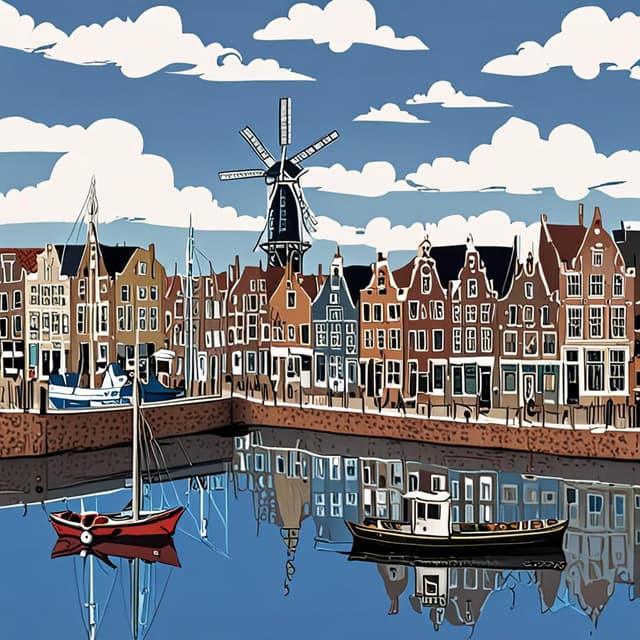
| Country | New Netherland |
| Founded | 1607 |
| Known for | Maritime history • Shipbuilding • Fishing • Blue and white ceramics |
| Also known as | The Blue City |
| Ceramics theme | Coastal location and nautical themes |
| Former capital of | |
| Replaced as capital by | New Rotterdam (New York City) |
| Influence on the nation | Ceramics gracing homes and buildings throughout the nation |
Delft, also known as The Blue City, is a historic port city located on the Atlantic coast of New Netherland, one of the world's major Dutch-speaking nations. Established in 1607, it holds a special place in New Netherland's history as the original capital of the nation and a thriving center for maritime and industrial activity.
Delft was founded in 1607 by Dutch colonists as one of the first settlements in New Netherland. Due to its strategic location along the Atlantic Ocean, Delft quickly grew into a prominent trading hub and naval base. In 1614, it was established as the capital of the new colony, a status it held until surrendering the title to New Rotterdam at the end of the 17th century.
Throughout the 17th and 18th centuries, Delft's maritime power, ship-building and fishing industries continued to flourish. At the height of its power in the mid-18th century, Delft was home to the largest fleet of merchant and fishing ships in New Netherland. By the late 19th century, the city had become an industrial center, with numerous factories and manufacturing plants shaping the region's economic outlook.
In the 20th century, Delft gained worldwide acclaim for its distinctive blue and white ceramics, known as Delftware. Inspired by the city's maritime heritage and the tranquil beauty of its coastline, skilled artisans crafted these magnificent ceramics, gracing households and buildings throughout New Netherland and beyond.
Delft is exquisitely situated along the Atlantic coastline, with picturesque beaches and harbors dotted with fishing boats and large cargo vessels. The city's layout is intricate and charming, characterized by narrow, winding streets lined with colorful homes and terracotta-roofed buildings.
Arguably, Delft's most iconic landmarks are the Maritime Arch and the Delft Lighthouse, famous for their intricate blue-and-white Delftware designs. Within the city's historical heart, visitors will find the Stadhuis, the city hall, an impressive example of Dutch Baroque architecture that dates back to the 17th century.
As a vital link for trade, commerce, and migration, Delft boasts a sizeable population of nearly half a million people as of 2020. The city is incredibly diverse, with a rich tapestry of languages, including Dutch, English, French, and Portuguese.
Religion is also a defining aspect of Delft's demographics, as the majority of its inhabitants are adherents of the Dutch Reformed Church. Throughout the city, quaint churches and religious buildings are a testament to the country's religious history.
Delft's economy is anchored by its maritime heritage, with the city's industries heavily leaning on shipbuilding, fishing, and associated trades. The port of Delft is one of New Netherland's major ports, continuously contributing to the national economy through the export and import of goods and resources. Delft's economy is further buoyed by the production of Delftware ceramics, renowned for their intricate beauty and exceptional quality.
Delft is home to a rich maritime culture, reflected in its annual Delft Maritime Festival. Historically, the festival celebrates the city's nautical history, showcasing traditional Dutch ships and crafts, maritime-themed music and food, and demonstrations of maritime skills and trades.
Ceramic artistry and production are another cornerstone of Delft's cultural identity. The artisans of Delft continue to preserve and celebrate the traditional techniques and designs of Delftware, contributing to a thriving cultural exchange in the city and beyond.
In addition to its maritime and artistic heritage, Delft is a center for academic and intellectual pursuits. The city is home to the University of Delft, founded in the late 17th century, as well as numerous museums and cultural institutions.
In summary, Delft is a city of unmatched maritime heritage and rich cultural tapestry. As a prominent economic and industrial hub in New Netherland, it stands as a testament to the nation's Dutch past and reflects its vibrant present and promising future.